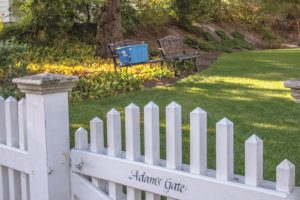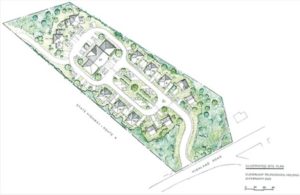TRURO — Health and Conservation Agent Emily Beebe had a lot of things to say about water quality and the Cloverleaf affordable housing proposal, both in a letter to the Truro Zoning Board of Appeals and at the Oct. 8 continuation of the ZBA’s hearing on a comprehensive permit for the project. Many of her comments came down to one simple premise, however: if it’s well water you’re worried about, look at your own septic system — and your neighbors’.
“[The Cloverleaf] proposal would treat the wastewater to a vastly higher degree than anyone else in your neighborhood,” Beebe told the ZBA. “Where you should be looking is not upstream at this site, but at what’s adjacent to you,” she added.
“It’s good to know that folks already have some [well water] test results,” Beebe said. “What you’re looking at now is what’s happening because of your own septic system and your neighbor septic systems.”
Water quality has come to dominate discussion of the Cloverleaf project, which would include 39 affordable apartments with 68 bedrooms. The Cloverleaf parcel is just shy of four acres. It is upstream of Pond Village, a neighborhood of homes clustered around the historic Pilgrim Pond.

Water quality in Pond Village is not a new concern. “The Board of Health has long held concerns about the eutrophication of Pilgrim pond…, nutrient inputs to this area, and private wells in general,” Beebe wrote to the ZBA in a letter dated Oct 7. “It is important to distinguish between the concerns noted in the Pond Village letter and the proposed Cloverleaf proposal before the ZBA,” the letter continued [emphasis in original].
Beebe’s reference to “the Pond Village letter” was about a public comment to the ZBA filed on Oct. 5, which included a cover letter signed by 77 residents who live near the Cloverleaf site and two appendices — one including new private well-water test results, and the other a 40-page report on nitrates in drinking water.
The water test results may have been obtained through a private effort to distribute test kits based at the Chapel on the Pond in Pond Village. The Independent was unable to determine who had organized that effort.
The 40-page report in nitrates was allegedly written by seven M.D.s and Ph.D.s in various specialties who have formed a group called Docs for Truro Safe Water. The report reviews new and recent studies on the connection between nitrates in drinking water and various cancers. It argues for a change in the regulatory standards for drinking water.
Repeated attempts by the Independent to contact the Docs for Truro Safe Water for comment have been unsuccessful.
The test results described in the Pond Village letter include 11 tests (out of a total of 27) in which the sample had more than 3 mg/L of nitrates, which is the board of health’s threshold of concern, said Beebe.
“At 3 mg/L, we send out a letter to the property owner and let them know that that level is higher than you want,” said Beebe. “We then proceed with an education piece with the property owner” about mitigation, she added.
To a great extent, mitigation is about finding and replacing failed septic systems.
“These plans may include mandatory septic inspection and maintenance … reduction of fertilized areas, stormwater mitigation on public and private ways, and the requirement for private or clustered advanced wastewater treatment systems,” Beebe wrote.

“There’s about five cesspools in the [Pond Village area],” said Beebe. “About 8 percent of the entire town is still on cesspools. We have a multitude of triggers to catch those and help them convert to Title 5 systems.” (Title 5 is the current standard for residential septic systems and has been in place since 1995.)
In September, Truro hired the Cape Cod Commission to do a watershed study of the Pilgrim Pond area. In addition to systematic well-water testing, the study will look at septic systems, runoff patterns, and possible funding sources for mitigation.
Funding would be welcome, because septic systems aren’t cheap. Brian Baumgaertel, director of the state’s Alternative Septic System Test Center, said a residential system runs between $12,000 and $50,000.
Most systems are upgraded only when the property is sold. Older houses that haven’t changed hands recently are more likely to have antiquated systems. A review of the Truro assessor’s records shows that the Pond Village area has a good mix of houses that were built or sold recently and houses that haven’t sold in decades.
The ZBA put off any votes on the Cloverleaf project until its next meeting, scheduled for Thursday, Oct 22. After an Oct. 8 hearing that was consumed almost entirely by public comments, board members indicated they might hold votes at the beginning of the next meeting instead of the end.



